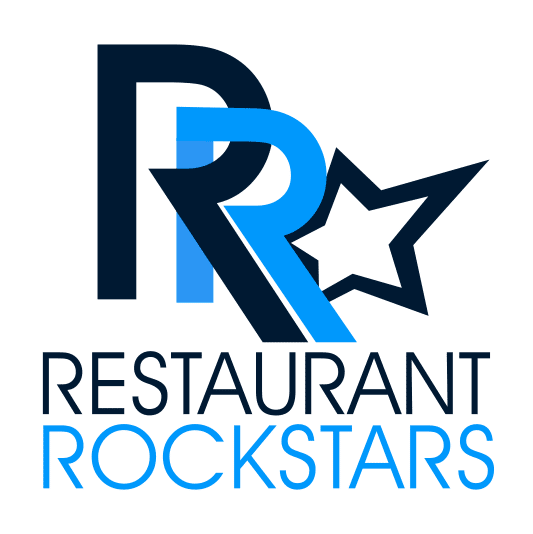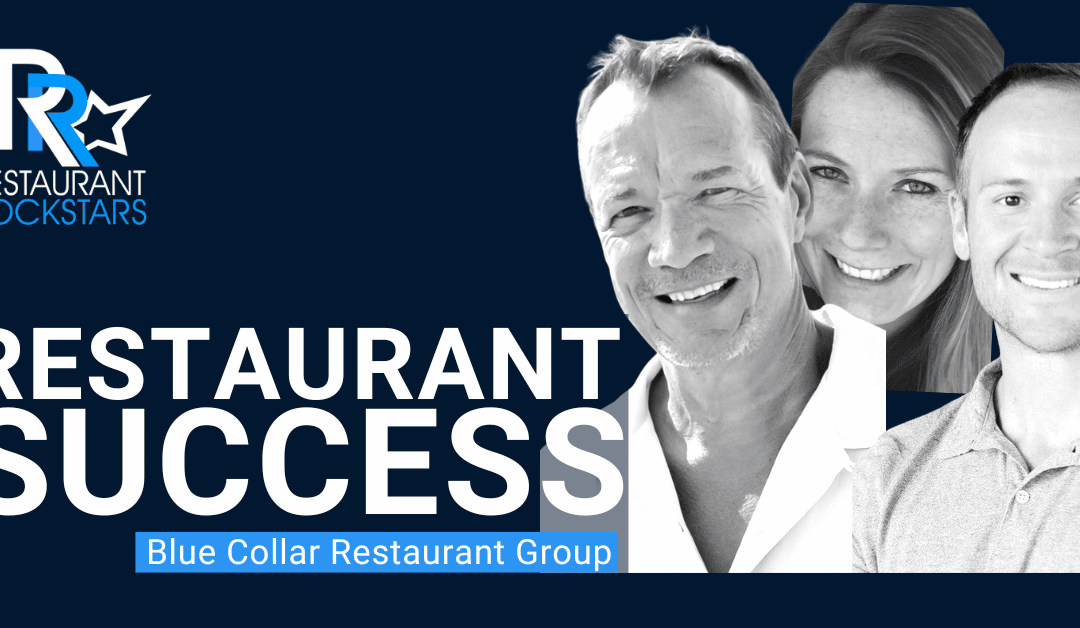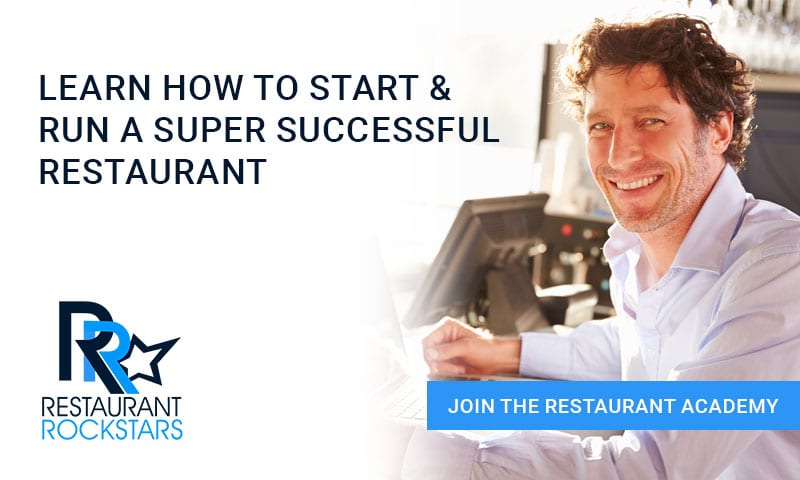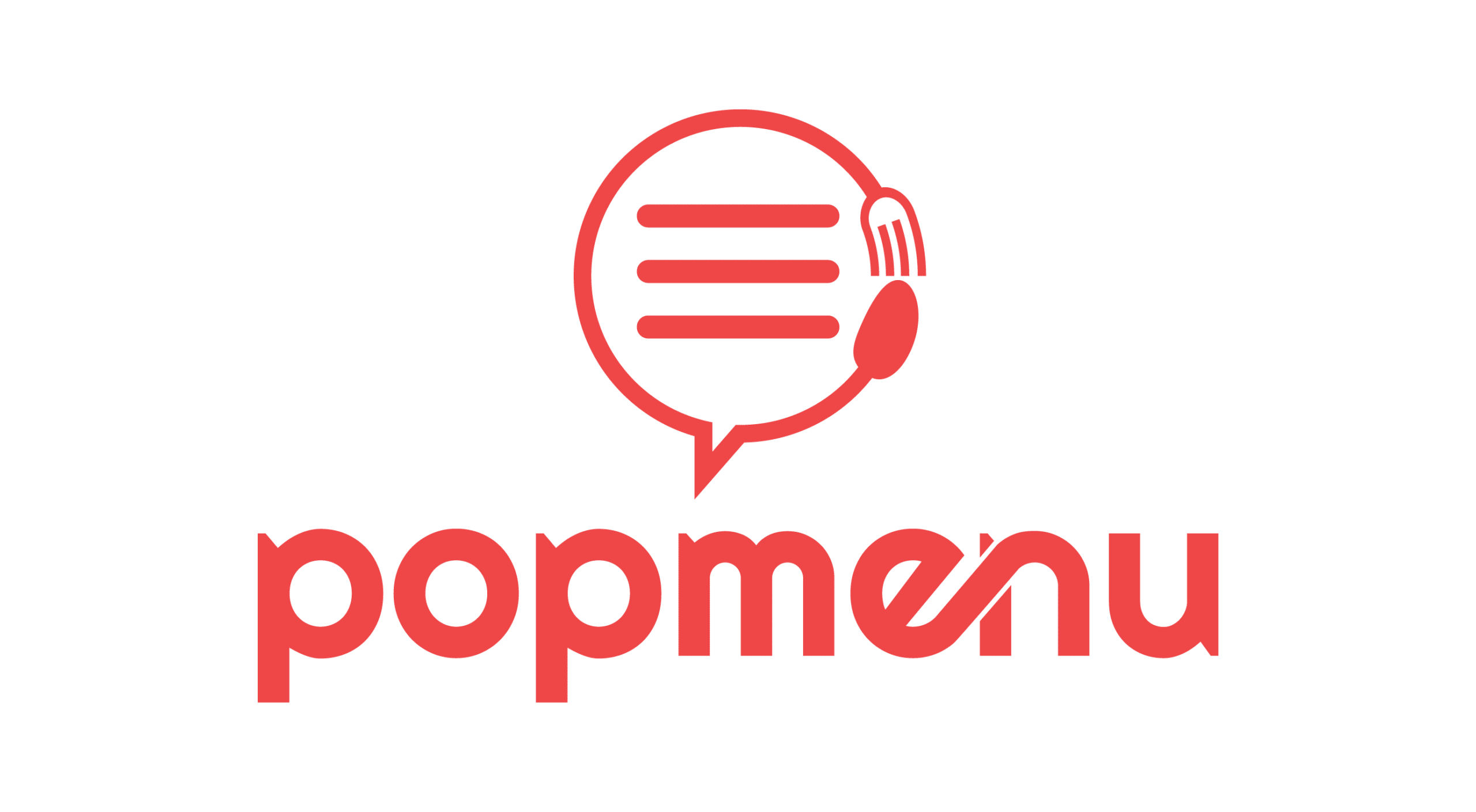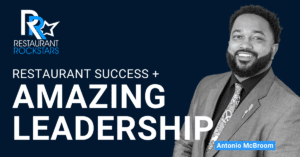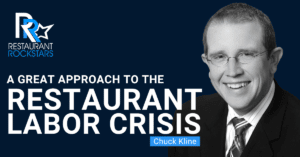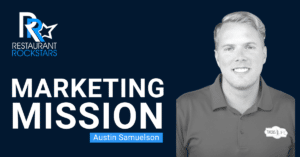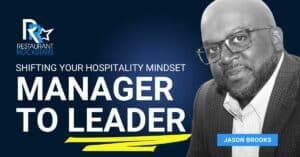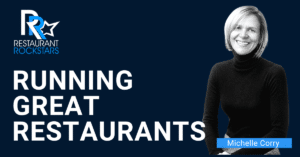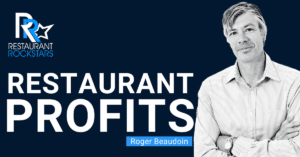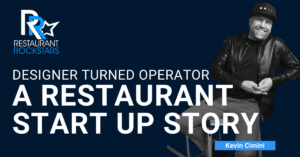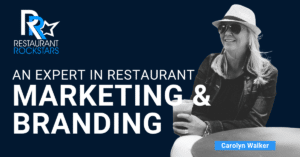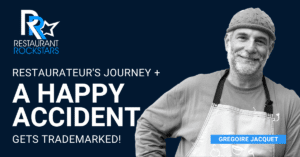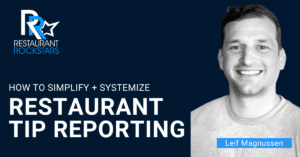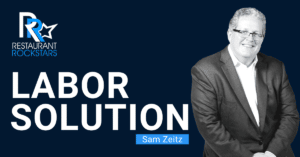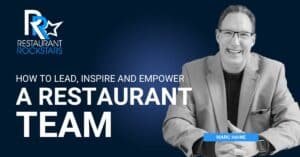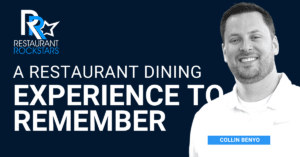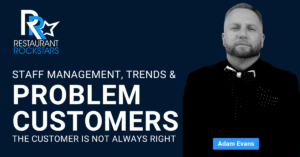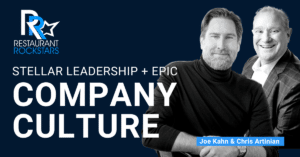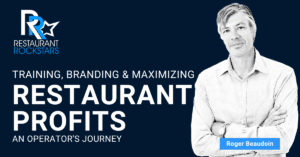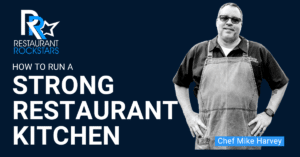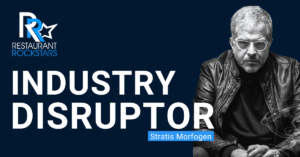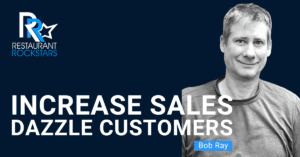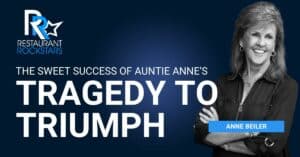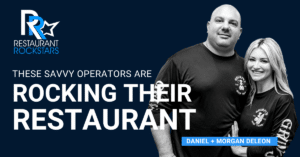Restaurant Rockstars Episode #305
Restaurant Success by Service First
LISTEN HERE OR ON YOUR FAVORITE PODCAST PLAYER
Prefer to watch the interview?
Click the video below.
You know a really great restaurant the minute you walk in the door.
It’s attention to detail, the way you’re greeted and made to feel comfortable, the ambiance, service provided and of course the food & drinks.
Hitting all these marks is a continual challenge, but my guests today aren’t missing a beat!
In this episode of the Restaurant Rockstars Podcast. I’m speaking with family operators Joe, Nicole and Blane of the Blue Collar Restaurant Group http://www.bcrg.co/
They have 9 concepts and growing!
Listen as they tell us:
- The true meaning of “Service First”
- How creating a culture based on family uplevels the guest experience as well as the team
- The importance of cross-training to increase skillsets and move versatile “key” team-members across the organization
- How supporting the communities, they serve, and veterans helps their restaurants “do good by doing good”
- Necessary technology that enhances the personal touch with their guests
- Recognizing up and coming talent for their operation and longevity of staff
And of course, dealing with today’s uncertainties in running restaurants.
Watch or Listen and then go out there and ROCK Your Restaurant!
Roger
@sidewindersbozeman
@tanglewoodmt
@foxtrotbzn
@hachisushipub
@bcrg.co
Unknown Speaker 0:00
It’s easy to get caught up because there’s no shortage of fires to put out in restaurants every day. And it’s easy to get caught up in like the task orientation of, yeah, I’ve got all of these, these line item things to get done, and forget about the people. And I think that taking more of a people orientation and less of a task orientation has been really key to our success.
Roger Beaudoin 0:26
Thanks for joining me back in the podcast. With me today are a family of operators running multiple concepts that believe in supporting veteran causes giving back to their community and above all, providing what they call service. First, we talk about all the ins and outs of running great restaurants. You’re not gonna want to miss this episode. Stay tuned.
Intro/Exit 0:47
You’re tuned in to the restaurant rockstars podcast powerful ideas to rock your restaurant, here’s your host, Roger Beaudoin.
Roger Beaudoin 1:01
rockstars your team are the foundation of your business and every shift, they’re leaving impressions with your guests in your restaurant. Now every impression counts and they have to be positive. Training is the key and absolutely essential to providing what I call amazing dining experiences. But effective training takes time and commitment if you had to do it yourself. Well, imagine a staff training tool that’s completely customized to your restaurant, brand, and restaurant. It teaches your entire menu and what makes your restaurant brand special. Then it trains your team your entire team to sell because sales are the lifeblood of your business. Now, it’s also important to recognize rising talent in your organization. This tool also trains future stars to become leaders that can run your business for you. I call that an exit strategy. Now this tool is called SRV. Now learn more at SRVnow.com. That’s srvnow.com Check it out.
Roger Beaudoin 2:03
Not answering your phone is one of the quickest ways for your restaurant to lose a potential customer. But between serving in person customers and dealing with the kitchen. It’s hard for staff to prioritize incoming calls. That’s why your restaurant needs popmenu answering simple questions to keep your phone line tied up can be handled without pulling a staff person from your in person hospitality. Reclaim the power of your phone. Popmenu answering is powered by artificial intelligence to answer the simple questions most people call in with like do you have outdoor seating or what are your hours within the pop menu platform you can customize answers for your restaurant and choose the voice your guests here plus create customized greetings. Popmenu answering picks up your phone 24/7 365 days a year turning every phone call into an opportunity. Plus popmenus full collection of tools helps optimize your restaurants website and menu streamlines your ordering experience and assists in retargeting to enable you to build long lasting relationships with your guests. Get help answering your restaurants calls now with pop menu answering. And for a limited time my listeners can get $100 off their first month plus an unchanging monthly rate at popmenu.com/rockstars go now to get $100 off your first month at popmenu.com/rockstars Welcome back everyone.
Roger Beaudoin 3:30
This is the restaurant rockstars podcast with me today are Joe, Nicole and Blaine, a family run owner operator business called BC RG also known as Blue Collar Restaurant Group out in the mountains of Bozeman, Montana. And let’s see you’re out in Jackson Hole is well. Welcome to the podcast everyone. I’m glad to be with you.
Guest 3:52
Great to be with you, Roger.
Roger Beaudoin 3:54
Well, you know my audience always knows that I start off with a backstory of my guests. Now everyone has a hospitality backstory. Now you’re a family owned and operated operation but maybe this goes back farther than the company you’re running. Now maybe you guys started off when you’re in high school, washing dishes or working in McDonald’s. anything is fair game. I’d like each of us, each of you to tell us where you all started and where the passion for the business came from.
Unknown Speaker 4:20
I’ll go so I started. Yeah, I think I was a busboy when I was 14 at a Pancake House in New Jersey. Then one summer of college. I got this wild idea in 1979 that I was going to start a restaurant. So I started a restaurant called the original salad bar. It was kind of before salad bars became really big. And I gave it my best shot. quickly went out of business six months later. And so that was my earliest thought, you know, being in the restaurant business.
Roger Beaudoin 4:57
Okay, very good. Nicole, do you want to go next?
Unknown Speaker 5:00
Yeah, sure. Obviously, I’m Joe’s daughter. So I kind of grew up in the restaurant business. But some of my earliest memories are going into the restaurants as a young girl, my mom and dad would cook in the restaurants and make all the sauces at our first restaurant marry piglets. And I remember helping my mom de Pitt avocados to make the guacamole for the day. And she’d always have a plate of pancakes for me. So that’s kind of where my first memory came from.
Roger Beaudoin 5:35
That’s nice, very good and lame.
Unknown Speaker 5:39
And my first restaurant job was in just a college job, cooking pizzas and washing dishes. No, nothing, nothing special, really, but definitely look back on it with fond memories.
Roger Beaudoin 5:53
Okay, let’s talk about BCRG, what’s the origin of the name and tell us the history of your brand and how it started and you know what your journey has been up until now.
Unknown Speaker 6:05
When my wife and I, I was in the Marine Corps, and I got to the Marine Corps in 1989. And I guess it’s always been in my blood. So we moved to Jackson Hole, you know, with very little money, and bought this little restaurant called very piglets. It was basically just a summer business only Labor Day Labor Day. And I’ve always considered myself a working man, I still do. And that’s where the origins of blue collar came from. Because we really stress a lot of our values and our company are about our people. And I think the blue collar denotes that.
Roger Beaudoin 6:49
Well, thank you very much. First of all, for your service. I have a special place in my heart for the Marine Corps. My father was a Korean War corporal in the Marine Corps. Wow. You know, I remember at his funeral, we had a marine Color Guard, they presented my mother with the flag, they played Taps, they shot the rifles in the air, it was a very, very moving ceremony. And I’ll never forget it. So again, thank you for your service. And for that as well. And your father’s Oh, thank you. Yeah. Yeah, that my dad was a wonderful man. And I learned so much from him. And yeah, the stories he could tell, I’ll tell you, but nonetheless, yeah. Let’s talk about the concepts themselves. The each individual concept, they’re all different. Now, your family runs all of them. They’re in different locations. They’re all different did one start first and then you know, they grew from there. And let’s talk about what those concepts are.
Unknown Speaker 7:40
Our first one was Mary piglet. So it’s our Mexican restaurant is our oldest concept. So we didn’t really start that concept. It’s been around since 1969. We bought it in 1989. But it was a basically a fast casual restaurant. Very, very basic when we bought it. And now we’ve turned it into a very full service. It’s been a full service restaurant for a long time. So that’s our first one. I’ll let these guys right one. Talk about the other ones, please do.
Unknown Speaker 8:13
Yeah. Let’s see after Mary piglets. Well, there was well, yeah, I didn’t know if you wanted to talk about Blue Moon or not. But there are some restaurants in between the restaurants now. But currently, Sidewinders was the next one. And that was in 1997. Right? Yes, yeah. Yeah. So that was a bar, a really only a bar at the time, and there was a restaurant connected to it. That was ours as well called the bloomin diner and that serviced all the food to the sidewinder side of things. And then we basically took the Sidewinders concept and expanded on that and made that a full service restaurant. My dad started that with all of his marine buddies that he flew with and the Marines so the whole concept is based on the military and to all American Grill. So that’s kind of the one we’ve grown with recently.
Roger Beaudoin 9:16
All right, very good. And keep on going.
Unknown Speaker 9:21
I guess after that, the next the next one that’s still around today. It was noodle kitchen. Well, the, as far as concepts that, you know, original concepts. We also acquired a long standing barbecue restaurant in Jackson called Bubba’s barbecue. That’s been in business, I guess, since what the 80s. I think a two was the so Bubba’s I guess I tell that story a little bit. Bubba’s was kind of struggling and and we started there just as on like a consulting bases. And then eventually, we’re able to buy in and. And that’s been a really great addition to the group that was, like 2013 or 14, I believe. And then noodle kitchen was right around the same time, we took an existing concept that Joe and Denise had started a few years prior to that called Ignite and sort of reinvented that into noodle kitchen, which is like an Asian bistro and sushi bar now, so
Roger Beaudoin 10:40
you have a very unique company culture. And I really want to get into the depths of that. But before we do, can one of you tell me about your tagline service first be kind do well, I mean, that says a lot. It’s a beautiful thing, it speaks to hospitality. But please define that a little bit further for us, because they know the audience, you know, in the times of service and hospitality lacking in some cases, based on labor shortages, and everything, it’s still so important to deliver those types of messages to our guests.
Unknown Speaker 11:08
You guys, go ahead, you guys, we’re not
Unknown Speaker 11:12
I can touch on that a little bit. We so I mean, the blue collar brand has been around for a while, I think, Joe, you know, could speak to that as far as like when he decided to really brand the restaurants as a group and kind of put the blue collar stamp on it. But we, we sort of refined the brand, like, two or three years ago with, you know, full brand package and the tagline. And we landed on service first as our primary tagline. Because we really believe that, that mentality, that service first mentality is what is truly like our competitive advantage within the restaurant space. We truly believe that, you know, regardless of the concept, and our concepts do range pretty widely from, you know, super fast, casual to pretty fine dining, that leading with that service first mindset allows for, you know, a consistent experience across the blue collar spectrum. And if we are able to do that consistently, then that’s what really ensures a great customer experience. Because basically, the belief is that, you know, you can come in and have really great food, but not so great service. And that makes the food not taste so great. But if as long as you have really great service, it’s okay, if we’re going to make mistakes, whether it’s on the food, or the cocktail that gets mixed for you or whatever. But as long as we’re providing really great service, then the customer is probably still gonna have a great experience.
Roger Beaudoin 12:51
Perfect. Let’s talk about company culture, because that affects the team that affects the guests. That’s sort of the overarching mission statement fits into that. But what do you stand for? And then how would you describe the culture of your company, in terms of the working relationships between your team, how you sort of communicate across the different brands, if you ever get together as a group, if there’s any team building, tell us what your culture is about and how it works?
Unknown Speaker 13:18
I’ll start. So basically, our culture is we just had a team meeting this morning with our management team, and Jackson. And we do have weekly leadership team meetings to with our senior leadership team. But I speak a lot to groups. And I enjoy speaking to people and groups. And I always start with what the Marine Corps taught me. And a few of our brand pillars are, you know, take care of your people. Leaders eat last. And there’s no special parking places. I mean, we I know we all have to have titles. But if you look at my signature page, it just says Joe rice, I drive a 71 Ford pickup, to remind me of where it came from, because I came from very little. So we’re very big on company culture and taking care of our people. And that means, you know, anything from they need to get their car fixed. They need help with their rent, whatever it is we do. And we were fortunate enough to be able to do that. And that’s why in our company, compared to the majority of restaurants in country, we don’t have a lot of staffing problems. We have people working first 28 years 20 A number of people working for us over 20 years. We their kids now work for us. So we stress so much our company culture, and we try to really lead by example, if I go to a restaurant I still in the dishes need to be done. I’ll jump into this pit. The floor needs to be swept by sweep before I still really look at myself as just another one of the staff helping to achieve the mission. So that’s kind of my in then, you know, Nicole and Blaine. I’m sure they have some to add to that, Nicole.
Unknown Speaker 15:11
Yeah, I think one of the biggest things that we talk about a lot is just family. I mean, we are a family run business. But it’s a lot deeper than that, like we really, we care about our employees, we care about their lives outside of work. We just, we always make a point to take that extra few minutes or whatever it is to really get to know our employees. Where are you from? Like about your family? What do you need? We’re here for you. We’re here to support you. And I think that’s like one of our biggest, like X factors, if you’d say, Absolutely.
Unknown Speaker 15:53
And I add something real quick. Oh, yes, please, please do. Roger. So I had a mentor named Jean Street from Dallas, Texas, he has stone because holiday Restaurant Group, he’s 85. Now he taught me the business. And I mean, from the financial side, you know, CFOs tie, you know, to how he ran his company. But one thing I always have disagreed with in the restaurant business was how much they work their people. So I think this is really important. Our staff, our management team works 40 hours a week, they get paid as much as this, the managers make working 60 hours a week, our chefs work, you know, the same. We believe everybody should have two days off a week, the same two days, if you have a family event, you go to that family event. And this may sound too good to be true. But this is exactly how we run a company. And people always ask us, How do you do it? And in my head, I’m always thinking, wow, why don’t you do it? You know, because people, you got to give people a life. If they don’t have a life, they’re not going to stay with you, no matter how much they’re making. And we have a number of examples in our company of people seeking us out from other companies. We have two new people, two new high powered pretty really good chefs coming into our company right now that have worked in other companies in this area, and are common here because of our culture.
Roger Beaudoin 17:16
You know, paying bills is one time consuming restaurant detail in 1000 other details. With plate IQ, your accounts payable is handled accurately and automatically. Plate IQ works with 30,000 restaurants of all types, eliminating manual data entry in your accounts payable process. Technology takes care of line item General Ledger coding to invoice payment through plate IQs vendor pay network. Now no more paper checks. Your restaurant can seamlessly flow from invoice, upload to payment, and even earn cashback from paying over 180,000 vendors in the network on time. Plate IQ is your paperless digital filing cabinet that frees your workspace from invoices, receipts and statements. You can search anytime by date, item or vendor. See when everything is due in manage schedules, approvals, payments, and filing right from your mobile pay digitally by check ACH or your plate IQ card. Best of all, no money leaves your account until it’s received by your vendor, which improves your cash flow and cuts confusion, it’s time to check out plate IQ at plateiq.com.
Roger Beaudoin 18:28
That’s a beautiful thing. That’s exactly how I ran restaurants. But it’s not common. And it definitely stands apart. And it’s clear that that’s what makes you successful from a labor standpoint. Blaine, anything to add to that?
Unknown Speaker 18:40
Yeah, I think one thing that’s, you know, really been beneficial for us over the past, you know, two or three years is the establishment like of our solidifying our core values and communicating those to our staff. Because there’s been countless stories now where people, you know, people can relate to those and people have the individual values themselves and they’re not going to share off we have five core values as a company, they’re not going to necessarily share all five all the time, but they share one or two. That’s how you really build a lot of you know, consistency and we’ve significantly lowered our turnover because people you know, when you share those values between an organization and for you as an individual, that’s that makes it bigger than a job. So people look at you know, how competitive the employment market has been over the past few years. And you know, employees jumping ship for $1 an hour here or there, or when they when they are connected to a value within your organization. They don’t really care about the dollar per hour they can get down the street because they’re bought in to you know, something that they know is bigger than you You know, whatever that dollar value is,
Roger Beaudoin 20:03
I’m getting the sense that your team have a voice that is welcomed to be heard in your restaurants, and that if they have good ideas, they’re encouraged to bring them forward. If something is broken, they’ll tell you about it. It’s like it’s open communication both ways. Jordy told us about leadership, by example, how important that is. But would you say that’s true? I mean, you all have open door policies, you listen, you encourage good ideas, and you’ll even implement them if you think that it’ll improve the operation.
Unknown Speaker 20:30
Yeah, we stress anybody that works for us that if you’re not willing to give us constructive criticism, we really don’t want you to work for us. And we, we had a number of I had personally, we had a management team meeting this morning that I participate in, then I sat with our general manager at Sidewinders. And our head chef at our at the blue line, which is a fine dining restaurant. And we and boy boy was getting some constructive criticism, and it was all good. And so that’s why we’re successful. I mean, that’s not the only reason. But I hate to hear like, oh, you know, something, when it’s two weeks later, I’m just like, hey, man, just come tell us. You know, because we got 500 plus people in the company, we can’t, you know, know everything all the time. So it’s strongly encouraged. I think people are very, you know, open to giving us that criticism, maybe not every one of us, but to one of us, that’s all that matters. Of course,
Roger Beaudoin 21:37
could someone take their owner manager hat off, put your guest hat on and tell the audience what you believe your guests would say about any given team member in any of your concepts.
Unknown Speaker 21:49
know, one thing that is really valuable to a lot of our guests is that they see the same faces, over and over again, you know, for a long time, we have a lot of loyalty with our staff. And so you know, they love to see that our staff is just happy where they work. And they look like they’re having a, you know, they look like they’re having a good time at work. And that, you know, results in people that stick around.
Roger Beaudoin 22:15
So I’m hearing that your team builds relationships with the guests, and they make friends with them. And they know each other by name, you recognize regulars, and you treat even new first time visitors as if they were regulars. Right. Does that happen?
Unknown Speaker 22:30
Yeah, and I add on to that, to that, in both Jackson and Bozeman, we really try to integrate ourselves in our communities. And that, from the guests perspective, like when they see us, you know, either out and about doing things for the community, or we just recently had a big Fourth of July float in the parade in Jackson, which was a lot of fun. But that just helps build those relationships even more, especially. And, I mean, those events a little bigger than Jackson, but they’re both relatively small communities. So
Roger Beaudoin 23:04
sure, right. That’s true. So it’s a tight knit community, of course, and it’s recognized, you’re not necessarily doing it for notoriety, you’re doing it because it’s a good cause. But it’s also good for business.
Unknown Speaker 23:15
Yeah, absolutely. I always made a conscious effort to do that. And, you know, Nicole, and Blaine and the rest of the team are doing that. Also, but I think it’s really important to be involved in community, we, you know, are kind of things we do for the community mainly is you sports, supporting kids, veterans, those are two major ones. We do a lot of different things. And we’re definitely known as that company.
Roger Beaudoin 23:48
That’s fantastic. Let’s talk about onboarding. What’s it like to onboard a new employee? Is there a sort of a shadow program going on? I’d like to know any specific training philosophies that you have recognition and rewards programs, all of it helps to develop that core group that then stays because you treat them differently than they might, you know, be treated at another employer.
Unknown Speaker 24:12
You guys go ahead and take that you’re more involved.
Unknown Speaker 24:18
You can start there. This is something that we’ve put a lot of time and energy into recently. As you can imagine, I mean, training especially across so many different concepts. is it’s a big it’s a big topic of discussion for us on a regular basis, and, and quite frankly, has been probably, you know, something that we’ve struggled with over the years and trying to figure out how to do it consistently. Well. I think at some points in the past, we’ve sort of depended on the capabilities of certain team members certain man managers, and you know, some managers are really great trainers and some managers not so much. And so we have pivoted a bit and now Good move forward with company wide like blue collar training guides that can take, you know, a new employee that’s just being on boarded from, you know, very little or no experience to a fully competent, you know, worker within any position in the company within a fixed time period. And the beauty of these training guides is that they’re, they’re generic enough to apply to all of our restaurant concepts, but specific enough to work, you know, per location. And so, you know, we can take someone right, right off the street, maybe someone with very little or no restaurant experience, and get them up to speed to be a server at, you know, Bubbas or Sidewinders, within a very definite defined period of time. A lot of it is just about being specific about, you know, the types of knowledge they need to be set up for success in their job, and then also an accountability system, so that we know, you know, who their trainer was, who the manager on duty was supervised that training, you know, giving them some incentives to, to move forward through that training protocol quickly and efficiently, that sort of thing?
Roger Beaudoin 26:34
Do you put more stock in personality and approach to the job versus coming in with experience or prior experience in the business?
Unknown Speaker 26:44
I would say that we aren’t gonna write anybody off because they don’t have any experience. So if it’s the right personality, we, for instance, we just had a busser, at one of our restaurants, a Blue Lion, who had really very, very little experience in any type of bartending, but he was very interested, he wanted to learn, and he’s now one of our better bartenders. So just because you don’t have experience, if you have the right work ethic and the right personality, and like just the will to learn. That’s almost even better, in my opinion.
Roger Beaudoin 27:25
Yeah, I totally understand that. Let’s talk about recognition and rewards programs. Do you have anything specific that singles people out for going above and beyond or helping a teammate or solving a guest problem or anything like that?
Unknown Speaker 27:41
Yeah, I mean, we have a number of things I could, they could probably talk about it more distinctly in us. But the two of the big the, one of the biggest things we’ve done as a company from day one, when we had no money, we always had a really great employee party. We’re known around this area as the place that does the best employee parties. And in those ploy parties. I mean, they’re blowouts now, in a good way, you know, we recognize a number of people in the company with some really, really nice gifts. So that’s usually twice a year with with the big get togethers. And then on a daily basis, we do stuff to whether it’s point putting points on their card to eat at any restaurant, so all our staff can eat at any restaurant or half off. All our management team eats in any restaurant for free. So with the staff, we do those kinds of things. And I’m sure Blaine and Ellie could add some to that. I mean, Blaine and Nicole sorry, Ellie’s my middle daughter, plaintes. Wife. I get all my kids mixed up. So
Roger Beaudoin 28:51
that’s exactly working the business as well.
Unknown Speaker 28:54
Yeah, so I have three daughters all in the business. Ellie, Nicole, Ellie, and Brooke and then Blaine’s my son in law.
Roger Beaudoin 29:01
Okay, got it. Excellent. So how do you recognize and develop talent within your organization to move people up, you must always have your eyes open for real standouts that you can see, they might start out as a busser or as a server, but they clearly have potential to be leaders in your organization. Is there any sort of recognition program and then training to get them up to speed to assimilate these positions?
Unknown Speaker 29:26
I just want to touch on this real quick because I’ve been doing it so long. So we have a Num number of incidents of where we pretty much our whole kitchen in Jackson is Hispanic. Most of these Hispanics that have been with me, almost as long as I’ve been doing the restaurant business. And they started knowing knowing English started as dishwashers. I told him how to cook on the line. Not all of them now but the older guys, and now they’re running our kitchens. So this morning in a meeting in the management team meeting because we’re opening In our third Sidewinders here in December, you know, I put it out to the staff, look, you know, we want to hire from within, that’s our first priority. If you know anybody that might make a good manager, let us know. And if anybody’s interested in being a general manager moving over to this new location, please let us know. So yes, that’s how we do everything we want to hire from within number one. But you know, sometimes we obviously have to go outside. But that’s our second option.
Roger Beaudoin 30:30
Do your team ever sort of pivot to different concepts? Do they move on to other concepts and move into those positions there? As I’m sure that’s happened on occasion? Is it a regular thing, every once in a while?
Unknown Speaker 30:46
It happens, I feel like it happens quite a bit. We have a lot of people, I think one of the strengths really, of the company is a lot of our managers, and a lot of our guys in the kitchen can work at multiple locations. And it helps, you know, it helps keep things fresh and exciting for those individuals. But it also gives us the flexibility to fill in spots if we’re, you know, lose if we lost somebody at a place where we need extra support one night, most of our staff that does that really enjoys that.
Roger Beaudoin 31:20
That’s terrific. Yeah, that’s, that’s wonderful. Tell us about the pandemic and how it affected your organization was a devastating, did you make it through Did you pivot numerous times did you bring in sort of new technology that you didn’t have before, I mean, maybe all the above, there’s so much meat there and so much to talk about,
Unknown Speaker 31:38
I’m just gonna start and I’m gonna pass it on. So when the pandemic hit I, you know, from the Marine Corps, I’m like, we’re gonna attack this head on, and we’re gonna kick it to us. And that’s what we did. Fantastic. So Blaine, and Nicole can talk about some of the stuff we did.
Unknown Speaker 31:53
I mean, right away, I think we jumped into, you know, the staff being top priority. We knew that, you know, obviously, we had hundreds of people whose income was at risk and, and so we need to look at that closely. And our goal is just to try to remain open in some capacity, in order to, you know, just be able to provide jobs as much as possible. And also, like a secondary effect of that, being that we wanted to remain constant. And we had that consistent impact with our customers, too, because we knew that, you know, if we, if we did decide to close for any period of time, it would just be that much more difficult to recover with customer base.
Unknown Speaker 32:49
I remember one of the first things that we did, and it’s kind of ironic now that we’re sitting on Zoom, but pre pandemic iden, I don’t think any of us knew about zoom or Google meet. And I remember we all jumped on a FaceTime call to discuss how we are going to attack the next few months. And, yeah, I think it was, it was a big change for everybody. But I do feel like we really were like, Okay, this is what it is like, what what do we need to do? How do we take care of our people? How do we stay open once we were able to reopen? And we were fortunate enough, once we got the green light to reopen that we didn’t have to close down again, maybe a day or two here and there. But for the high majority of the time, we were able to be open seven days a week at full time hours. So we’re very fortunate for that. Very good. We
Unknown Speaker 33:43
also Roger we also, you know, we thrive during the pandemic. We were very fortunate to be in Montana and Wyoming. That not to be in California. Are these other states that were shutting the small business down? Yes. And which really pissed me off? Knowing what you know, I think we had an early read on this whole thing. We really studied it. We studied what was going on with it. And we were very aggressive in the way we did things. And it paid off. And we’ve I hate to say it because we usually don’t say this kind of stuff. We were right.
Roger Beaudoin 34:25
I call this the business of 1000 details, and you’ve got more important things to worry about than calculating and paying your monthly sales tax on time. Well, that’s where Davo comes in. Davo puts sales tax on autopilot for restaurants. Davo uses sales tax data from your point of sale system to set aside the exact amount of sales tax you collect every single day, and then files it and pays it when it’s due on time for your restaurant every month. Davo takes just five minutes to set up and once it’s up and running, you never have to worry about paying sales tax again. Davo costs 49.99 Per POS connection per month, and your restaurant can try Davo for the first 30 days free devil was created by a successful restaurant chef and owner who knows what’s important for your operation. Time is money, and you’ve got more important things to focus on, like pleasing your guests, you can’t put a price on peace of mind when I tried Davo for the first 30 days at Davosalestax.com.
Roger Beaudoin 35:25
That’s terrific. That’s a great approach to the business, you tackle that head on and just full speed ahead. That’s great. Let’s shift gears a little bit. As owners, we can be critical, and we’ve got a discerning eye and we have, you know, high standards, but we do eat out in other restaurants, right? When we have free time, or you know, whenever it is, what do you consider to be the secret sauce of a really great restaurant? If we forget about your concepts just for a moment and your dining out? What do you notice that impresses you? What do you notice that inspires you to get new ideas from going out to other places, tell us about that.
Unknown Speaker 36:04
I mean, when we go out to eat as a family, my husband is not in the business, but he always laughs because it’s like, we’re all you know, we’re looking at everything we’re looking up, we’re looking over, we’re looking down, we’re lifting plates upside down, looking at what kind of brands they use, of course, you know, so a lot of ideas just in that way, just quipment and smallwares, and just the look of things, but I think really, the biggest thing is just the service, you know, we, we always talk about that. And when we go to a restaurant, we get really good service, it always kind of leaves a lasting imprint.
Roger Beaudoin 36:46
That’s what it’s all about. That’s it, I’ve always believed it’s the biggest competitive advantage, you know, food and ambiance are very important, but service really stands apart. And that’s really where you can shine and set yourselves apart from the competition. So it’s clear in your organization that you know, service is your driving philosophy, but what are the other elements that you would consider to be, you know, enhancers or contributors to your particular success? What’s the secret formula ipcrg, that makes it really work and successful.
Unknown Speaker 37:17
I think definitely, like, you know, food quality, beverages, the, at the end of the day, the product that we’re putting on the plate, or in the in the glass, service, all that is important. But I think that ever since we’ve really started putting a focus on, like having complete brand packages, for each of our restaurant, each of our restaurants, I think that’s made a big impact too. Because, you know, we’ve really been able to help control our reputation both as like a company and individual restaurant concepts through, you know, that that complete brand package, I even think you know, back to your last question about, you know, what do we look for when we go out to other restaurants and stuff, I think, you know, branding can mean so many different things. It’s, you know, it’s your signage, it’s the uniforms that your staff is wearing, it’s the type of plates and silverware, it’s the furniture, it’s the color scheme. So it impacts the customer in a lot of different ways. And we’ve been more intentional about those decisions that we’re making with each individual restaurant concept. And, you know, the, the blue collar Restaurant Group concept as a whole. And, you know, being being more attentive to how all those decisions make our customers feel, and what they what, how it makes them think of us as a company. All right, if I could add
Unknown Speaker 38:48
some real quick, right, absolutely. Joe, go ahead. So I always tell the team, you know, we always try to use we never I as a company. But the customers experience starts when they get out their car is the park and luckily, you know, as they walk in, are they being greeted, you know, hey, not three, two, hey, how you doing day you guys in town? What are you up to, you know, start a conversation a little bit, but not get stuck, obviously. But I can give you an example. We had a leadership retreat with our leadership team. Both markets, we went to Phoenix, and we had a dinner planned at a restaurant in Phoenix or Scottsdale, wherever. And we walked in and were all blown away by the atmosphere. But by the time we left, we were like, Nah, because the atmosphere was great. But when we sat down the service was very average. The food was very average. So the initial impression, at least for me, personally was wow, this is pretty cool. But then by the end of it, it wasn’t. So you really got to have I always say you got to have a wow factor and little bit, I mean someplace and get away. With pay this whole loan was just a home run. But when we build a restaurant, we always want a wow factor. When people walk in, they’re like, Wow, this is pretty cool. But then you got it back that wow factor. So that restaurant in Phoenix had a wow factor, but they didn’t back it up.
Roger Beaudoin 40:16
I’ve always used that term myself, you know, and it really began with the plate presentations, we wanted every plate presentation to be perfect, so that when you sat that dish down in front of any guest or customer, they would say, Wow, the other guests at the table would say, Wow, maybe the camera phones would come out. But then I suddenly realized it’s not just about the food, everything about the place should have wow factor. You know, the way you’re treated even as a first time visitor the ambiance, the hooks, what makes your, you know, your concepts unique and stand apart from the competition, it should all be about Wow. So I’m really glad you brought up that term. You can
Unknown Speaker 40:49
you would fit in our company. Thank you guys. Yeah, the same philosophy, it sounds like,
Roger Beaudoin 40:55
let’s talk about staying relevant. You know, there’s countless stories about restaurants that were around for 50 years and even longer, and then they didn’t keep up with the changing clientele. And they suddenly went out of business, even though they’ve been around forever. So you know, you don’t fix what isn’t broken. But to stay relevant. Sometimes you have to keep innovating. Let’s talk about that within your company, and what you might do and how you feel about that.
Unknown Speaker 41:18
So Jean, St. You could Google him, he’s he’s a great restaurant tour, he always taught me this. He he always said Don’t let your concept get tired. You know, so we’re always trying to, like we Mary pickets has been around over 50 years. Sidewinders has been around, what over 20 years, they’re still powerhouses, but we’re constantly, you know, not constantly, we’re upgrading the interiors, we’re changing things up. We’re, you know, always doing menu improvements. But we don’t want to be a, you know, like a number of chains, or changes to be the thing in the 80s. Right, independence would kind of get until now. Chains come and like stay in our restaurants and try to figure out how we’re doing things. Because we’re basically, you know, I think good independent restaurants are kicking chains is this is my point. No, because we’re disagree. We’re agile, and we always preach quick reaction team. If something’s broken, let’s get it fixed. Now, I’m not gonna wait till tomorrow, we’re going to fix it right now. What you know, whatever that is.
Roger Beaudoin 42:29
Yeah, part of that in the chain is there’s 10 layers of management. And every level has to get approval from one above, before they can institute anything that might, you know, set them apart or make it work better. So I would absolutely agree with you just the agility, and the innovation, the creativity, and the passion. And the pride that goes into running an independent restaurant and growing that group to multiple concepts is, you know, you got so much above the chains just for that, you know, that approach alone, and we give our people the power to make those decisions. You know, we delegate, you know, all the time. And you know, delegating supervise,
Unknown Speaker 43:05
we preach that. But they’re they’re allowed to do what they think is best for the company.
Roger Beaudoin 43:12
Well, you mentioned earlier leadership by example. And I don’t want to speak for you, but I’m a big believer in leader versus manager, and empowerment versus delegate. Because there’s a difference between those things a leader is acting exactly how you are Joe, you notice something that needs to be fixed, you fix it, you empower your people to see things and notice them before the guest sees them and fix that you’re empowering your people. But empowerment versus delegating, I believe any manager can tell somebody what to do to me that’s delegating. But empowerment is recognizing talent in someone nurturing that talent, developing it, giving them more responsibility, giving them room to fail, praising them for their accomplishments, and then giving them new responsibilities, and then recognizing rewarding them for that. And I’m, I’m pretty sure from what I’ve heard before, that’s how you run your company, because your longevity of staff is so is so long, you know, your tenure is, is you don’t have high turnover. So I think that’s tremendous. I want everyone in the audience to hear that because I think the pandemic has forced us to operate that way now. Because in the past, before we had all these labor issues and other problems, it was pretty common for managers just to delegate to people tell them what to do, you know, you’d come in for your paycheck. But I think that people that really rose above had something special in them to begin with. But I think the whole paradigm shifted the pandemic for staff to be better, and leaders to be better if you wanted to keep your people because I think you mentioned that yourself. I mean, it’s not uncommon that restaurant owners or managers were sort of pirating staff from other restaurants right out of the parking lot when people got out of work saying, hey, I’ll give you two bucks more to be my line cook or whatever. And those are horrible stories, but they happened, you know, so it’s unfortunate, but I think if people took a pay Ah out of your book, maybe this whole industry would operate a whole lot smoother. And I want everyone to hear to hear and know that. So thank you so much for sharing. Well,
Unknown Speaker 45:08
I think your point of empowerment over delegate is probably a better word than delegate. And maybe we’ll start using that more than the delegate, because that’s what we’re doing. We’re empowering people to make decisions, we’re not telling them what to do. We’re saying, hey, just figure it out. If it’s the wrong decision, we’ll talk about it, but you’re not gonna get fired for making a decision, we want you to make that decision.
Roger Beaudoin 45:30
That’s, that’s terrific. I totally agree with that. So thanks for clarifying. Let’s talk about loyalty and affinity, I know you’ve got a loyalty program, but what is it about your concepts that bring people back again and again? And how do you encourage them to come back again, and even to build your your customer base through you know, word of mouth, which is always the most powerful form of marketing, you know, word of mouth, and, and all that sort of thing just leads to a stronger business, but let’s talk about loyalty or affinity, how does it work?
Unknown Speaker 46:00
I mean, I think the biggest things with our restaurant is we’ve kind of touched on it a little bit, but our customers, they know, they’re gonna get consistent, great service, they know they’re gonna get high quality food. And they’re, they’re gonna get it at a relatively reasonable price. So it’s, this is something that we even talked about this morning, and my dad talks about a lot, it’s just because the majority, almost all of our restaurants are casual dining, that doesn’t mean that they can’t get the best service and the best food, you know, just because we’re not a fine dining restaurant, so and the fact that we offer that but then we also offer like the relationship side of things where we, we know about our a lot of our customers, we know about what they have going on there. Their kids work for us now are the kids that we coached when they were little want to come work for us. So it’s definitely multifaceted.
Roger Beaudoin 46:58
Anything dad Blaine?
Unknown Speaker 47:00
Yeah, I think I think just the consistency is like, is what really breeds loyalty, you know, consistency within a certain concept. You know, we have certain customers that, you know, the regulars Sidewinders that are there multiple days a week, because they love that chicken potpie. And it’s made the same way every day. And they, you know, they can rely on that. But then also the consistency, from concept to concept, that service first mentality, that customers know that if I go to a blue collar restaurant, I’m going to have, you know, certain elements of my experience are going to be consistent across, you know, from location to location, or now even Market to Market, right if I live in Jackson, but I’ve got a sports tournament in Bozeman this weekend, I know, if I go to one of the blue collar restaurants, I’m going to have a good experience. And that because that’s always a risk you take as a, as a restaurant customer, like if you’re gonna go spend real money in a restaurant you’ve never been to before. You never really know what’s going to happen, right. And so I think that the standards that we’ve set, as a company like as blue collar Restaurant Group, and being able to keep those, like, uphold those consistently across all of the different brands and locations, is what really breeds the loyalty across, you know, within our customer base.
Roger Beaudoin 48:23
How are you handling rising costs of food and labor and all those things? Have you had to raise prices? Have you, you know, overhauled your menus to make them tighter cut back on certain things? Joe? Sounds like he’s really on top of the finances. Maybe that’s his answer. But can you tell me about that?
Unknown Speaker 48:41
Well, yeah, I mean, I, you know, it’s, we, you know, we talk about as a company a lot, you know, our food costs are up, our Labor’s up, and our profits are down, because we can not charge $25 for a hamburger. So how we handle is we push it as far as we can for proceed value, and then we stop. And so are, you know, right now our margins are down due to high high food costs, and labor costs, but you know, the good news was, I checked the case of chicken wings today, it was only 80 something dollars. So you know, that that’s a pretty good price in this market. You know, so I’m hoping that, you know, things will level as far as changing stuff on the menu at our finer dining restaurants, we have more flexibility to do that. You know, like at the blue line, we have a lot of game, you know, l buffalo, you know, prime steaks, you know, so our margin is, you know, even though lamb is our big dish there, and we’re charging $60 For lack of rack of lamb, but nobody’s even blinking at that. But guess what, our margin is still lower. So we’re fine, you know, as a company, Will. This is not something we can’t hand though, but, you know, we have we talked about today, you know, you know, portion control becomes extremely important right now, because you know, that’s a good way to get our food costs, right? You know, even with these high prices, if we can keep our portions exactly what we need, or I was looking at a, I was on the line yesterday at Sidewinders. And our French dip, you could barely Close the roll. And I’m like, I went to our head kitchen guy who’s sitting right next to me, Rico has been working for me forever. And I go Regal, how many ounces is this? And he said, six ounces, I said, I think we can cut this buy at least an ounce, and nobody would care. You know, so that’s it stuff we’re doing. We’re trying to, we’re trying to do those kinds of things. And our food costs are, you know, in the low 30s, which is good in this market, you know, and sometimes even some restaurants are still a little below 30. You know, so
Unknown Speaker 50:55
I think to add on to that, too, we it kind of goes back to relationships, we have a lot of long standing and good relationships with most of our vendors. So we’re constantly working with them every day on our their, you know, products we can lock in prices with and can we work out this deal. And just having that long standing relationship has definitely helped us a lot in some of those areas. But we are really on top of everything. Like we check every invoice anything that’s off by a few cents. We’re like, Hey, what’s going on? Why is this up? It says on our price, so we just have to pay even more attention.
Roger Beaudoin 51:37
Thank you for sharing that that is so critically important, because so many things can potentially slip by. And every single day things add up to a lot of dollars versus cents, if you’re not watching, so I think that was an excellent point. Let’s take that a step further. Obviously, it’s been important to have your menu costed out regularly to make sure that you’re maintaining your margins if possible. And it’s more important now than ever. And one of the things that I’ve done, you know, when I personally coach restaurants and sort of do a cost profit analysis on the menu, and I’m sure you wouldn’t be surprised at how often it’s an eye opener when I show them that their lower profit items are the most popular biggest sellers, and that every time they sell this appetizer versus that they’re losing this many dollars. And it’s even more, you know, significant on the entree side. And that is just so critically important. But I come across a lot of operators that don’t even think to take things that far, do your kitchen managers actively, you know, keep on top of that sort of thing or Jody ride herd on that. We have,
Unknown Speaker 52:40
so we have a buyer in our company that is charged of all our buying, he works, you know, he was a chef. This years and so we’ve created this position for him. So he sends out a weekly sheet on pricing. He works with the all the food vendors every week, we get all our prices loaded into our computers on Sunday night, right. And we have programs where they’ll highlight the best price apples to apples. So it automatically happens. Our kitchen manager are pretty good at it. But we really count on us to help them monitor this stuff. So but we are what you were saying Roger is so accurate. There’s so many people, I don’t know what the percentage is, you probably know more than I do about it. Because you’re you work with a lot of different restaurants. They don’t even understand food costs or pricing or center to play pricing or whatever it is. And it it’s so important. You know, if you don’t understand that, it’s gonna be very difficult, especially in this environment to be successful. Because what you just said, you know, you’re selling this appetizer, you’re making $2 on it, if you’re selling this one to make $10 on it, or whatever, you know, so we’re very, you know, we’ve been doing this 34 years, I think, you know, we don’t go around blowing our own horn. But we, I will say this, we know what we’re doing.
Roger Beaudoin 54:04
I’m really happy to hear you say that. And I’m glad we brought up this point because I think it’s important for our audience to understand that that they really need to be bottom line oriented. As a case in point, you know, I just wrapped up a consulting assignment with a client that had a $2.8 million restaurant, single location, only annual basis $2.8 million. And I literally showed them that over the past year, they lost a potential profit of $343,000 against that 2.8 million simply because there were dollars in the spread difference in each category and the lower profit items were stealing significant sales while they’re paying the highest wages in the place to the cooks to cook anything. So again, a complete menu redesign is is on the table immediately. But you can also stop the bleeding short term simply by knowing what your most profitable items are and recommending those to your guests through your staff through Education. And like you said, portion controls are critically important. And like Nikolas said, speaking to your reps and saying, Is there anything of comparable quality that maybe you bought in greater quantities that the economies of scale, give me a better price? You know, all those things are critically important. And then what you said, Joe, it’s like, we all know, there’s so many operators out there that think taking inventory is walking around figuring out what the order is that week, not calculating what the value is, at any given moment in time of the true value. So Prime costs, labor costs, these are all the critical numbers that affect your bottom line, in a low margin business, that shrinking every single day based on uncontrollable variables that, you know, nobody can control. So thanks for bringing all that to bear.
Unknown Speaker 55:42
I want to add up on a prime cost. So we get bonuses to our managers for Prime costs. You know, so if we hit our prime cost every month, the kitchen managers get bonuses, and all the front of the house managers get bonuses and the bartender. You know, so we had, that’s another incentive program that we do. And, you know, so there, but I guarantee you, most restaurants don’t know Prime costs are,
Roger Beaudoin 56:08
this is true. That is, that is absolutely true. And if we, you know, if we can just share that with the audience, and one restaurant hears this message, it may improve their business. So again, super important. Let’s talk about future growth plans. Are you growing your operation? Are there more concepts in your future?
Unknown Speaker 56:25
I’m just gonna say one thing. I mean, my wife had been married almost 40 years, we’ve been pray, well, a few people like you, Roger that knows the restaurant business from the dish pit, to the kitchen, to the front of the house. I am, I have fortunate to have three great daughters and a son in law that wants to continue to grow the business, and I’m in full support of it. We have a, you know, Blaine, you should start to talk about that a little bit, since you haven’t talked a little bit, but I’ll let them go with that.
Unknown Speaker 57:02
So we, we’ve really been trying to unify our vision as a team. I think, you know, for the past 30 years, the you know, Joe and Denise have really set that vision for the company. And that’s gotten us to where we are today, which is awesome. But you know, as we look into the future, and we know that we are operating on a larger scale, and depending on so many more people to execute, you know, we really need to ship have a shared vision, and everybody be on the same page. And so that was a big topic of discussion at the retreat that Joe mentioned, when we are in Arizona. And one of the things that I think, really changed during the course of that retreat was people coming into those meetings with maybe a vision of us continuing to roll out a bunch of new original concepts like we’ve been doing over the past few years. I mean, in Bozeman alone, we’ve opened four restaurants in five years now, since we opened Sidewinders, Bozeman in 2017. Now we have four restaurants, three new original concepts and Tanglewood Fox Trot, and hace. And so I think a lot of people came into that retreat, thinking, Oh, we’re just going to be doing more of that, you know, new original concepts, you know, finding niches in each of our markets. But I think by the end of the retreat, we’re all on the on the same page of, you know, our efforts are much more worthwhile picking concepts like Sidewinders and married piglets, and finding locations, that that really makes sense for us to replicate. And being able to do that, because it allows us to operate with this Lean leadership team that we have. And everyone gets to benefit, I think, really exponentially more than we would if we try to continue to do more original concepts. So I think that’s really our vision. Now how big it gets is kind of remains to be seen. But like Joe mentioned earlier, we have another Sidewinders. It’s under construction now. And definitely, you know, goals to open more locations in Bozeman between Sidewinders and Mary piglets. So that’s definitely you know, what, what the future holds, it just kind of remains to be seen what skill we take it to?
Roger Beaudoin 59:40
Well, you know, the most beautiful thing of all is this is such a lasting family legacy that’s going to continue for generations. And it’s going to be such a proud thing to watch as the company grows in that family members continue to get involved and expand the business just based on the proud heritage it already has. So I think that’s tremendous. That’s wonderful. Let’s Question. We’ve covered a lot of ground today. And one of you or each of you can answer this, but what is your best advice to operators that have made it through the pandemic? So far, they’re still beaten up by the labor crisis. And there’s, you know, some of them are ready to throw in the towel. But you know, the worst is over, how do you get to the other side? And keep on going and improve your business? What would you say to those people that are that are in that position right
Unknown Speaker 1:00:24
now? Well, I’ll go first, I’ve always had the attitude of take no prisoners attitude, I will not fail. And, you know, just keep your head down. And if you’re not doing things, like the things we talked about today, in the podcast, learn them. Because that’s what’s gonna get you through this. You really got to know your numbers, you have to know, you know, your prime cost. And all that. And if you don’t understand that, call, Roger, they’ll help you.
Roger Beaudoin 1:01:01
To help one restaurant at a time, anything I can do to improve the industry. Thanks for sharing that. Joe. Anything you wanna share? Nicole?
Unknown Speaker 1:01:09
Yeah, I think on top of everything, he said, Don’t, don’t be afraid to get your hands dirty. Like don’t lose touch with maybe where you started. I think something that I always try to remember and tell myself is like, I never want to not be in the restaurants doing stuff. I never want to be somebody that just sits in an office, on my computer and making phone calls, I want to be able to get in there and expo shifts or help bus or do whatever you need to do to help, you know, bring your team together to realize like you’re willing to do everything, it you know, that it takes to make this successful.
Roger Beaudoin 1:01:53
Thank you. Explain anything that.
Unknown Speaker 1:01:56
Yeah, I think, you know, specifically regarding the, you know, the transition that we’ve seen since the pandemic, I think, you know, a lot of restaurant tours, whether they come from like Joan Denise’s background of you know, getting started with really nothing working, you know, through every position in the restaurant, or someone like Nicole who grows up in a family business or myself, I mean, really, you know, get started, you know, just managing restaurants and that sort of thing. It’s easy to get caught up because there’s no shortage of fires to put out in restaurants every day. And it’s easy to get caught up in like the task orientation of, yeah, I’ve got all of these, these line items, things to get done. And forget about the people. And I think that taking more of a people orientation and less of a task orientation has been really key to our success through the pandemic and into the future. And so that would be my my biggest piece of advice.
Roger Beaudoin 1:03:02
Well, I can’t thank you all enough. You’re certainly doing so much to uplevel. This industry, and just your approach to the business is just such a fantastic information for our audience. And there were so many key takeaways in this based on your operating philosophy. So thank you so much for being with us. Thanks. Thank you. That was the restaurant rockstars podcast. We thank our audience for tuning in. We wish everyone to stay well and we’ll see you in the next episode. My sincere thanks to Joe Nicole and Blaine of the blue collar Restaurant Group. I so enjoyed talking shop, and hearing all about your ins and outs of running really great restaurants, your service philosophies, the family culture that you’ve instilled in your restaurants, it’s really a well done operation. So thank you very much for joining us. Thanks to our sponsors of this week’s episode, plateIQ, popmenu Davo and serve the restaurant training app found at srvnow.com. Can’t wait to see you on the next episode. Stay tuned and don’t miss it.
Roger Beaudoin 1:04:05
People go to restaurants for lots of reasons. What the customer doesn’t know is the 1000s of details it takes to run a great restaurant. This is a high risk high failed business. It’s a treacherous road and SMART operators need a professional guide. I’m Roger. I’ve started many highly successful high profit restaurants. I’m passionate about helping other owners and managers not just succeed, but knock it out of the park. You don’t just want to run a restaurant. You want to dominate your competition and create a lasting legacy. Join the academy and I’ll show you how it’s done.
Intro/Exit 1:04:43
Thanks for listening to the restaurant rockstars podcast for lots of great resources, head over to restaurant rockstars.com See you next time.
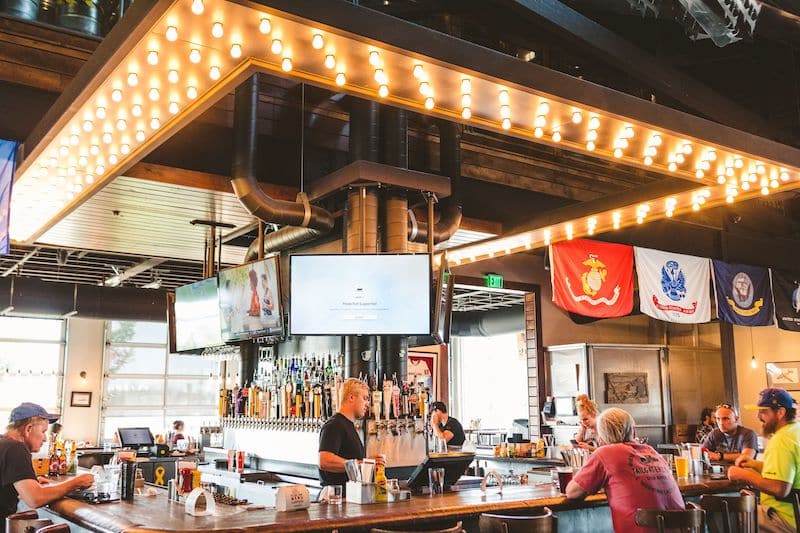
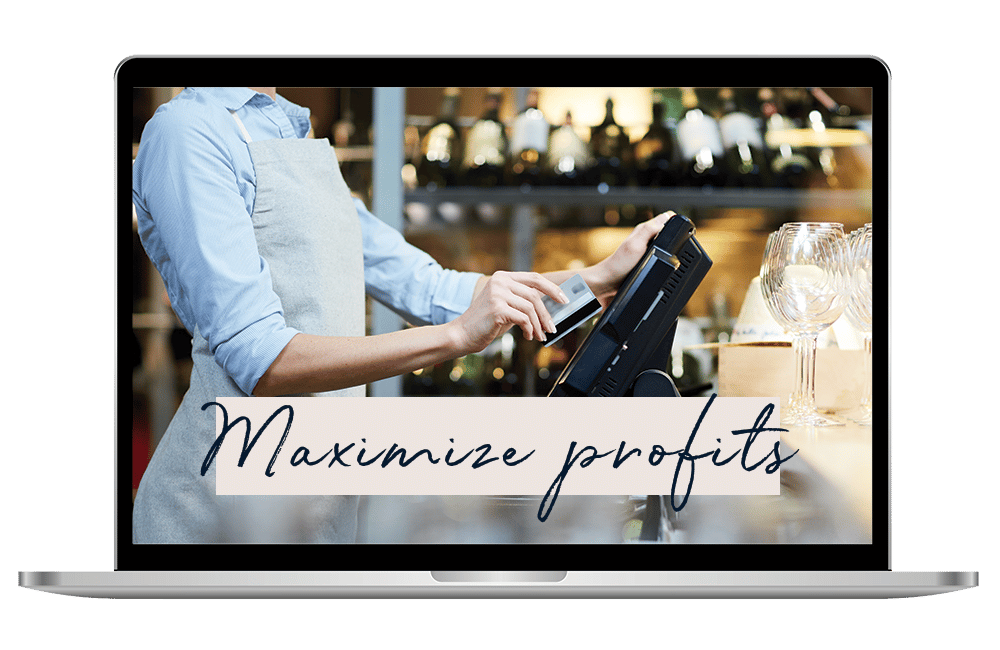
The three costly mistakes you could unknowingly be making?
Find out in this FREE guide and restaurant assessment specifically designed to reveal the unexpected hurdles standing between you and exponential business growth.
Thank You To Our Sponsors

Automate Your Sales Tax. Why Not Try Davo FREE for 30 Days.
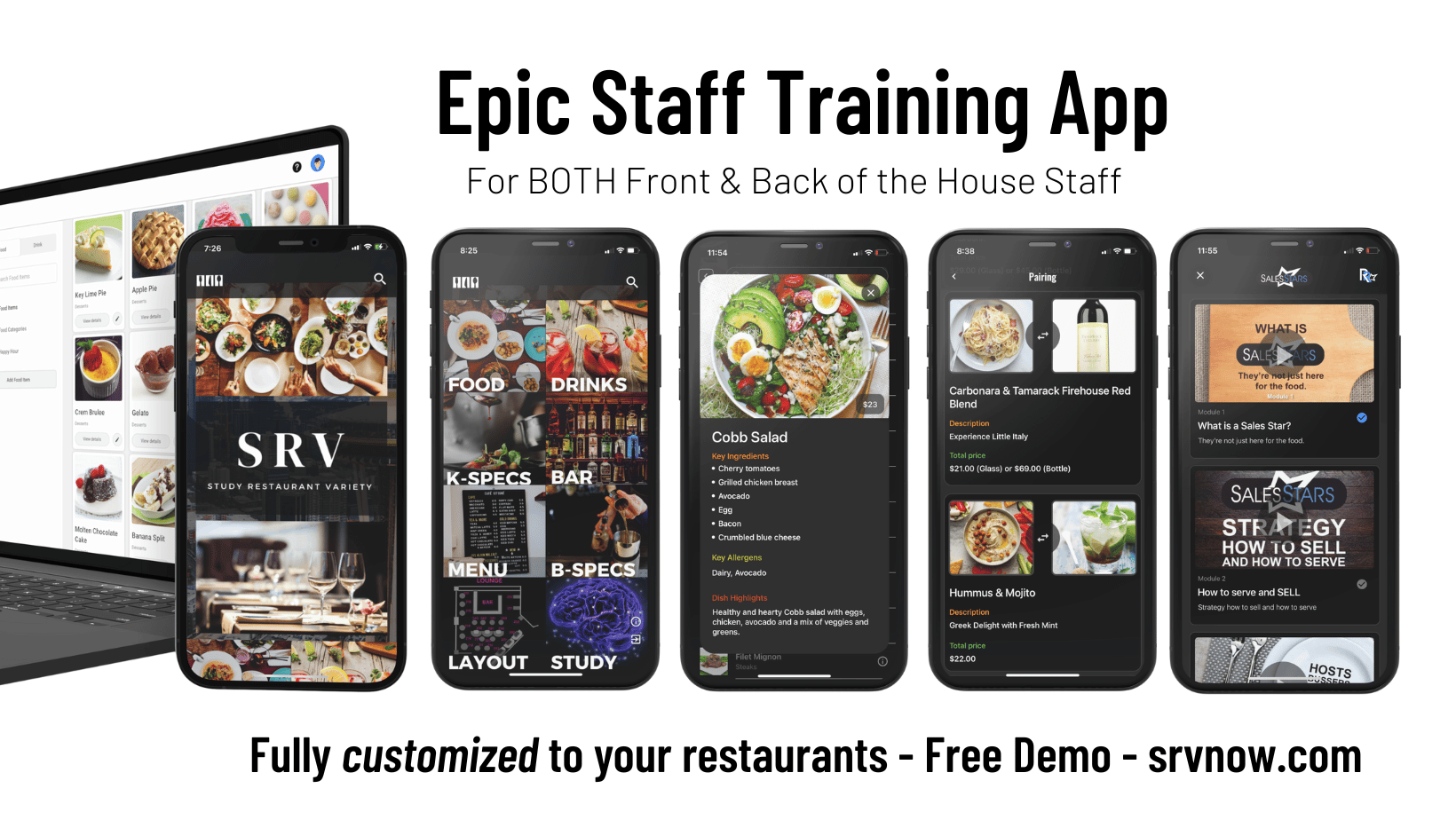
SRV teaches your team to profitably sell and accurately create the food and drinks at your restaurant.
Unlock Staff Potential and Maximize Sales

Simplify and automate your accounts payable. Process, approve, and pay all of your company’s spend from anywhere - Request a Demo
Want to become a podcast sponsor?
Please get in touch with Roger at roger@restaurantrockstars.com
